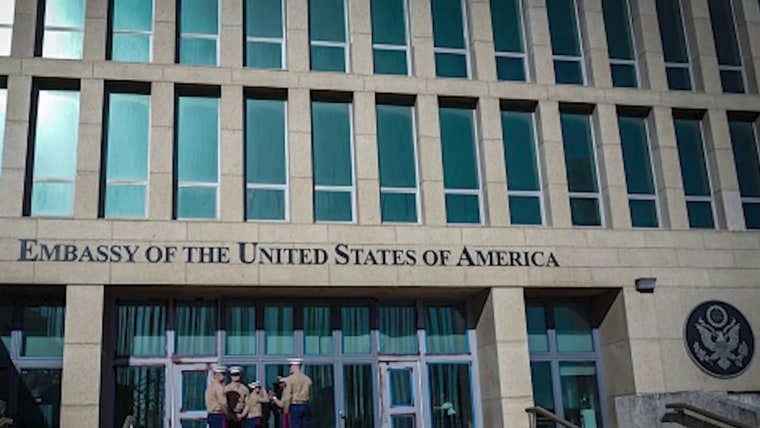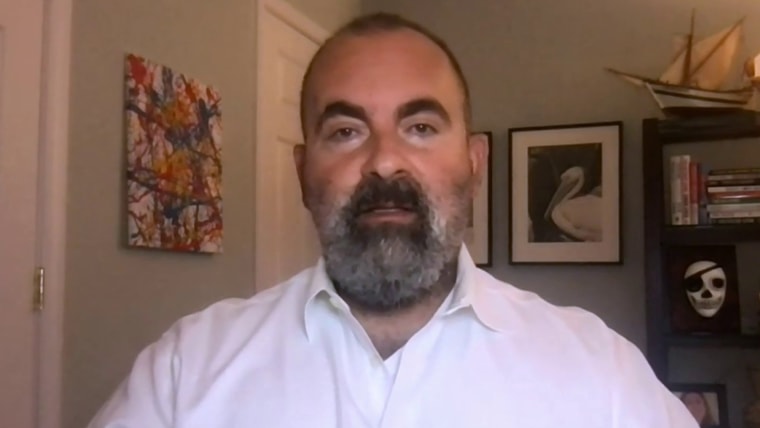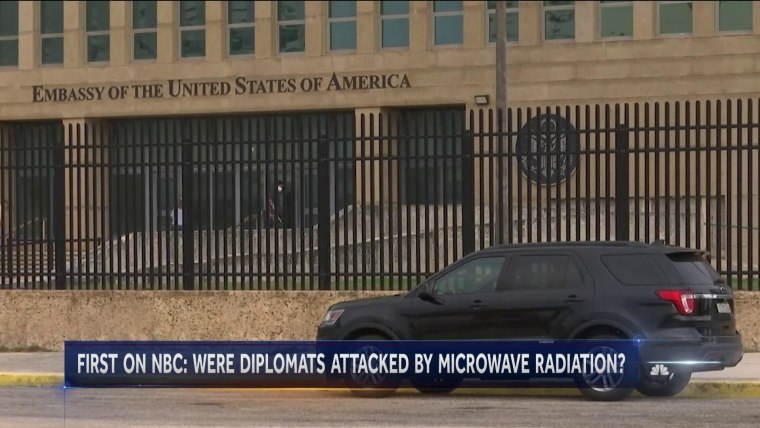WASHINGTON — As many as 200 Americans have come forward to describe possible symptoms of directed energy attacks, part of a wave of fresh reports that includes newly identified incidents around the world, Western officials say.
A U.S. official with knowledge of new potential cases of so-called Havana Syndrome said a steady drumbeat of cables has been coming in from overseas posts reporting new incidents — often multiple times each week.
A recent and previously unreported incident in Berlin cut short at least one diplomat's term in Germany, U.S. officials and others briefed about the matter said.
Another person who was briefed this month about recent incidents said, "It is global — but there seems to be an awful lot going on in Europe."
Officials with direct knowledge said there are now possible cases on every continent except Antarctica. In the past year, officials said, more than one American in the Central Asian country of Kyrgyzstan has experienced symptoms, including a baby.
Almost half of the possible cases involve CIA officers or their relatives, two officials said, while about 60 involve Defense Department employees or relatives, and around 50 were linked to the State Department.
A number of FBI agents and personnel — both current and former — have come forward after having experienced symptoms while overseas, especially in Europe and Central Asia, sources said. Several FBI employees reported to officials that they were hit in Vienna, including some possible cases dating back more than a decade.
In a statement, an FBI spokesperson said: "In keeping with DOJ policy, the FBI can neither confirm nor deny the existence of specific investigations. However, we will direct you to recent statements made by Director Wray in testimony before Congress where he underscored the protection, health, and well-being of U.S. government personnel is the highest priority; we view all U.S. government personnel who have these symptoms as potential victims and will treat them as such; and we care deeply about our colleagues in the federal government."
A Defense Department spokesman said: "The Department is heavily engaged on this issue as a part of the [National Security Council]-led interagency process across the federal government to address anomalous health incidents, and is fully committed to determining both the causes and source. The safety, health and welfare of our personnel remains a top priority for the Department."
Biden administration officials said government employees were encouraged to come forward if they had experienced symptoms and cautioned that not all people who have done so will end up being considered Havana Syndrome cases.
A senior administration official said: "In certain cases, these incidents have upended the lives of U.S. personnel who have devoted their careers to serving our country. Our government recognizes how important it is to make sure they get the care they deserve and that we get to the bottom of this as quickly as possible."
In Vienna, officials say, at least one American was sent home because of the severity of the symptoms. The New Yorker was the first to report as many as two dozen cases in Vienna.
"When it comes to Vienna, in coordination with our interagency partners, we are vigorously investigating reports of possible unexplained health incidents among the U.S. Embassy community there, and we're also doing that wherever these incidents are reported," State Department spokesman Ned Price told reporters Monday.
U.S. officials have said they do not know what explains the mysterious neurological symptoms first experienced by U.S. diplomats in Cuba, and in public they avoid using the word "attack" in favor of "anomalous health incidents."
The National Academies of Sciences, Engineering and Medicine said in a report last year that some of the observed brain injuries were consistent with the effects of directed microwave energy, which the report said Russia has long studied.
NBC News reported in 2018 that U.S. intelligence officials considered Russia a leading suspect in what some of them assess to have been deliberate attacks on diplomats and CIA officers overseas. But there was not — and is not now — conclusive intelligence pointing in that direction, multiple officials who have been briefed about the matter said.
U.S. officials have said privately that they suspect that Russia may be using a microwave energy device either to secretly gather digital data or to intentionally injure U.S. officials in a campaign of harassment, which Russia denies.
A team of medical and scientific experts who studied the symptoms of as many as 40 State Department and other government employees concluded that nothing like them had previously been documented in medical literature, according to the National Academies of Sciences report. Many reported hearing a loud sound and feeling pressure in their heads, and then they experienced dizziness, unsteady gait and visual disturbances. Many suffered long-standing debilitating effects.
Former CIA officer Marc Polymeropoulos, who believes he was hit during a trip to Moscow in 2017, said what has happened is "a mass casualty event."
CIA Director William Burns has ordered a significant intelligence-gathering effort to determine the cause of the incidents, and he has pledged that employees who report them will be taken seriously and given treatment.
"Director Burns is personally engaged with personnel affected by anomalous health incidents and is highly committed to their care and to determining the cause of these incidents," a CIA spokesperson said.
An intelligence official said, "The intelligence community has convened a panel of experts from across the U.S. government and private sector to work collectively to increase understanding of the possible mechanisms that are causing these anomalous health incidents."
The State Department also has a panel of medical and scientific experts examining the cases, and like the CIA panel, its members have access to relevant classified information.
But some U.S. government workers who have reported worrisome incidents in Western Europe to their superiors in the State Department have been met with skepticism and disbelief, three people with knowledge of the situation said. In one case this year that has been widely discussed among U.S. diplomats, a worker reported a potential incident in Europe but was brushed off, told that they were serving in a low-risk region where it is unlikely that U.S. operatives would be targeted.
Some cases that appeared at first to be part of the cohort of Havana Syndrome incidents were ruled out later. A group of U.S. troops in Syria reported symptoms after a Russian helicopter was seen hovering overhead, for example, but it was determined that the troops had come down with food poisoning.
U.S. intelligence agencies have launched a significant effort to find new information. They are combing through data seeking clues, including records of cellphone calls and geolocation data around the times and places of reported events, officials say. As NBC News and other news organizations have reported, the CIA used geolocation data to determine that Russian intelligence officers were near the scenes of some of the incidents, but the finding is not considered conclusive, given that U.S. officials are often under surveillance.
In a bid to centralize and improve care for U.S. workers who are injured, the U.S. government is working to ensure that they have access to military medical "centers for excellence," where Sen. Jeanne Shaheen, D-N.H., has introduced legislation to get victims access to specialized medical care, including Walter Reed National Military Medical Center. The government is considering selecting a prominent academic institution as a center for acute and chronic care for patients, three people with knowledge of the deliberations said. If selected, it would be the third academic institution the government has turned to for help after having sent its workers to the University of Miami and then the University of Pennsylvania.
Concerned that the incidents, still unsolved more than four years after they came to light, may continue well into the future, government agencies have refocused efforts on "mitigation" — finding ways to lower the risk to staffers — as well as detection to identify when an attack might be taking place.
Working off the leading theory that pulsed microwaves affected people's brains, the State Department's Diplomatic Security Service has helped develop and deploy small physical detection devices in Cuba and a handful of other posts, three people with knowledge of the devices said. They declined to describe them because many of the details remain classified.
"many" - Google News
July 20, 2021 at 03:30PM
https://ift.tt/3kzx6Ym
As many as 200 Americans have now reported possible symptoms of 'Havana Syndrome,' officials say - NBC News
"many" - Google News
https://ift.tt/2OYUfnl
https://ift.tt/3f9EULr



No comments:
Post a Comment